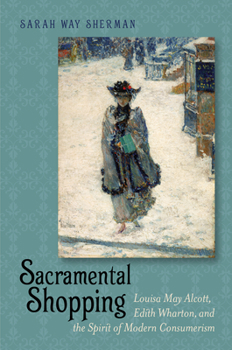Sacramental Shopping: Louisa May Alcott, Edith Wharton, and the Spirit of Modern Consumerism (Becoming Modern: New Nineteenth-Century Studies)
Select Format
Select Condition 
Book Overview
Written a generation apart and rarely treated together by scholars, Little Women (1868) and The House of Mirth (1905) share a deep concern with materialism, moral development, and self-construction. The heroines in both grapple with conspicuous consumption, an aspect of modernity that challenges older beliefs about ethical behavior and core identity.
Placing both novels at the historical intersection of modern consumer culture and older religious discourse on materialism and identity, Sarah Way Sherman analyzes how Alcott and Wharton rework traditional Protestant discourse to interpret their heroines' struggle with modern consumerism. Her conclusion reveals how Little Women's optimism, still buoyed by otherworldly justice, providential interventions, and the notion of essential identity, ultimately gives way to the much darker vision of modern materialistic culture in The House of Mirth.Format:Paperback
Language:English
ISBN:1611684374
ISBN13:9781611684377
Release Date:October 2013
Publisher:University of New Hampshire Press
Length:336 Pages
Weight:1.20 lbs.
Dimensions:9.3" x 0.9" x 6.1"
Customer Reviews
0 rating





